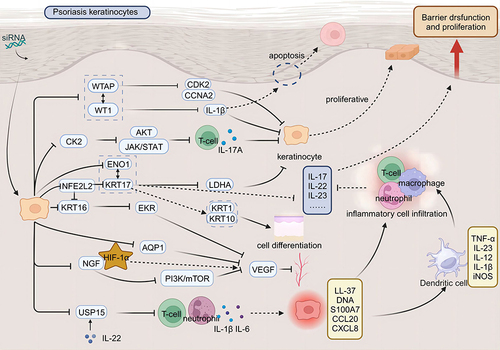Figures & data
Table 1 Therapeutic Role of siRNA in Psoriasis and Its Potential Applications
Figure 1 Therapeutic applications of siRNA in targeting pathogenic pathways underlying psoriasis. Therapeutic application of small interfering RNA (siRNA) targets the pathogenic pathways of psoriasis. In a physiological state, skin keratinocytes proliferate normally and fulfill a barrier function. In the pathological state of psoriasis, immune cells activate keratinocytes, leading to their rapid proliferation, abnormal differentiation, and inhibited apoptosis; this also promotes angiogenesis and increases inflammatory cell infiltration. Such activation disrupts the skin barrier function and causes a dysregulation in the normal proliferative capacity of keratinocytes, exacerbating the condition. siRNA therapy represents a promising strategy for treating psoriasis by silencing disease-causing genes. siRNA targets keratinocytes, silencing genes such as Casein Kinase 2 (CK2), WT1 Associated Protein (WTAP), WT1 Transcription Factor (WT1), and Enolase 1 (ENO1), which inhibits their proliferation. This action induces their normal differentiation and promotes apoptosis. Additionally, silencing genes such as Aquaporin 1 (AQP1), Nerve Growth Factor (NGF), and Keratin 16 (KRT16) inhibits Vascular Endothelial Growth Factor (VEGF), thereby hindering angiogenesis in psoriasis; Furthermore, targeting genes such as Ubiquitin Specific Peptidase 15 (USP15) and Keratin 17 (KRT17) can reduce inflammatory cell infiltration and attenuate the inflammatory response.

